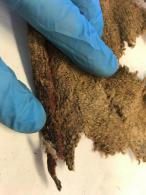
Michèle Hayeur Smith, a Research Associate at the Haffenreffer Museum of Anthropology at Brown University, has been awarded a new grant by the National Science Foundation for her three-year project: Archaeological Investigation of the Eastern North Atlantic Trade and Globalizing Economic Systems. This is her third NSF award from Arctic Social Sciences that she has done through the Haffenreffer Museum.
Past research by Dr. Hayeur Smith has found that nearly 1,000 years ago, the Vikings of the North Atlantic traded and sold cloth in northern European markets. This project traces trade in cloth, from the 9th century to the late medieval and early modern periods (18th century) by analyzing textile collections from both rural and urban, North Atlantic and European contexts.

This project aims to “provide an engendered, interdisciplinary perspective on trade, women, and the emergence of early globalized economies in the North,” says Dr. Hayeur Smith. By analyzing the unique handiwork of women artists and their isotopic signatures, the study will demonstrate that women's work was key to developing medieval commodity markets, providing a foundation for understanding modern day globalization. Women have often been left out of the archaeological record, but Dr. Hayeur Smith’s project aims to highlight the impact of women’s work on global trade, and show that they were not necessarily oppressed or put down as is often thought.
The Northern Women Arts Collaborative blog features the ongoing research of Dr. Hayeur Smith, who has been collaborating with artists and other researchers to link academic research about traditional Northern women's work with contemporary artists and artisans. More details about the Archaeological Investigation of the Eastern North Atlantic Trade and Globalizing Economic Systems grant are available on the National Science Foundation website.